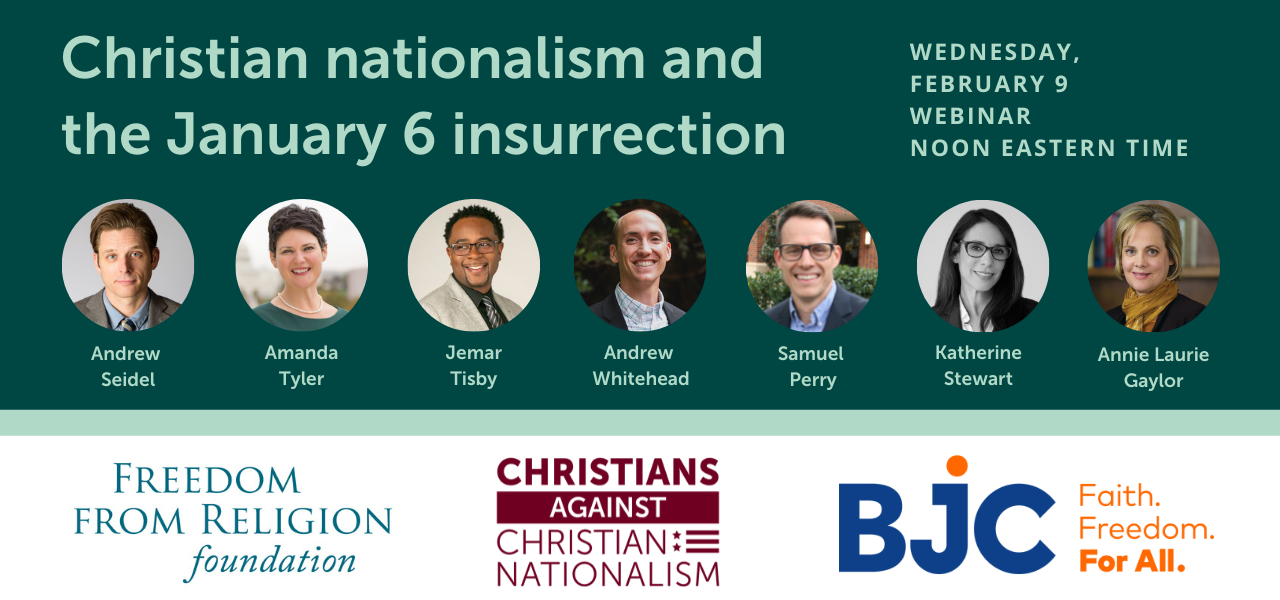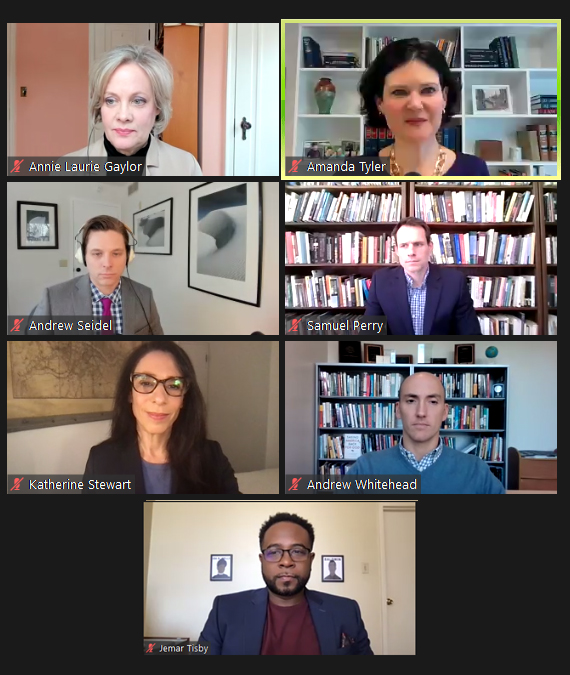Christian nationalism and January 6
New comprehensive report from BJC and the Freedom From Religion Foundation illuminates the role of Christian nationalism in the insurrection at the U.S. Capitol

With all of the coverage of what happened at the U.S. Capitol on January 6, 2021, the role of Christian nationalism in bolstering, justifying and intensifying the attack has been largely underreported.
BJC and the Freedom From Religion Foundation (FFRF) brought together experts and researchers to take a look at the impact of Christian nationalism on the day itself and in the weeks and months leading up to the insurrection, drawing on reporting, videos, statements and images from a myriad of events.
The work culminated in the most comprehensive report on the ideology and its connection to the attack: Christian Nationalism and the January 6, 2021, Insurrection. Released to the public on February 9, 2022, it features contributions from prominent experts on Christian nationalism, including Dr. Andrew Whitehead and Dr. Samuel Perry, authors of Taking America Back for God: Christian Nationalism in the United States; Dr. Anthea Butler, the Geraldine R. Segal Professor of American Social Thought at the University of Pennsylvania and author of White Evangelical Racism; Katherine Stewart, author of The Power Worshippers: Inside the Dangerous Rise of Religious Nationalism; Dr. Jemar Tisby, historian of race and religion and author of How to Fight Racism and The Color of Compromise: The Truth about the American Church’s Complicity in Racism; Andrew L. Seidel, a constitutional attorney at FFRF and author of The Founding Myth: Why Christian Nationalism is Un-American; and Amanda Tyler, executive director of BJC and organizer of the Christians Against Christian Nationalism initiative.
The report provides a brief overview and history of white Christian nationalism in the United States, followed by a look at the networks of power and money that prop up the ideology and a detailed blow-by-blow account of events and activities tied to January 6. The end of the report looks toward the future and how our country has responded.
As the report lays out, Christian nationalism is a political ideology and cultural framework that seeks to merge American and Christian identities, distorting both the Christian faith and America’s system of government.
“Christian nationalism is not Christianity, though it is not accurate to say that Christian nationalism has nothing to do with Christianity,” wrote Tyler in the introduction to the report. She explained that Christian nationalism relies on Christian imagery and language, and the political ideology continues to be rebuked by many people, including Christian clergy and laity.
“In other words, to oppose and work against Christian nationalism is not to oppose Christianity; in fact, many Christians see opposing Christian nationalism as key to preserving the faith,” Tyler wrote.
Many of the authors came together for a live event releasing the report on February 9, speaking about their work in a webinar.
The extensive document begins with a sociological explanation of Christian nationalism in America and the demographics that underlie this ideology, written by Dr. Whitehead and Dr. Perry. They shared more about their research in the live webinar.
Dr. Whitehead pointed out that white Christian nationalism is a key part of the story in making sense of January 6.
“In a variety of surveys that we’ve collected and others have collected throughout 2021, we find that white Christian nationalism not only provided theological cover for the insurrection — with this idea of this is a country that was ‘given to us’ by God and we have to take it back — but also as a part of mutually reinforcing other important influences motivating the violence that we saw,” Dr. Whitehead said, noting that two-thirds of white Americans who strongly embrace Christian nationalism believe the 2020 election was rigged and did not reflect the “will of the people.”
Dr. Perry said that recent research reveals new, troubling ways Christian nationalism is reshaping the understanding of the insurrection. He noted that data collected between February 2021 and August 2021 shows that people who subscribe to the ideology have doubled in their support of the rioters who were at the Capitol.
“We feel like this is absolutely necessary to look out for how Christian nationalism is being used in conjunction with conspiracy theory, in conjunction with misinformation and siloing of information sources,” Dr. Perry said. “We believe this is going to be a powerful motivator for future and potential violence.”
In a section on white Christian nationalism, Dr. Butler looked at how it has been a unifying theme for a particular type of narrative about America: One that says the country is a divinely appointed nation that is Christian and was established on Christian principles, with white men as the leaders. “This narrative has been employed in various ways throughout our nation’s history, in peacetime, war, expansion, and internal strife,” she wrote.
After noting the Confederate constitution invoked “the favor and guidance of Almighty God,” Dr. Butler shared how the Confederate defeat was turned into a “noble cause” that continued to focus on Christian themes and the sacralization of its war dead. “Using monuments to support their cause, they created physical monuments that would later be rallying points for modern day conflicts, such as the Charlottesville rally in August 2017.”
Dr. Tisby wrote a section exploring the different ways Black Christian communities fuse faith and political action, pointing out that “a Christian commitment to God and country does not always mean making America a white man’s country.”
During the webinar, Dr. Tisby expounded on the difference.
“Although white Christian nationalists have an understanding of religion that leads them to a very exclusionary, xenophobic, racist expression, there are other examples — such as Black Christians — who have understood their faith as motivating them toward a multi-racial democracy,” he said.
Stewart’s section explored the network of leadership tied to Christian nationalism.
“The strength of the movement is in its dense organizational infrastructure: a closely interconnected network of right-wing policy groups, legal advocacy organizations, legislative initiatives, sophisticated data operations, networking groups, leadership training initiatives, and media and messaging platforms, all working together for common political aims,” she wrote.
In the webinar, Stewart laid out three conditions essential in enabling the January 6 coup attempt: An information bubble where a large block of supporters are separated from other facts, a promotion of a feeling of persecution and directing that at political enemies, and a belief that “the legitimacy of the United States government derives from its commitment to a particular religious and cultural heritage, and not from its democratic form.”
Stewart explained the cost of shifting beliefs about the country.
“It’s astonishing to so many of us that the leaders of the January 6th attack styled themselves as patriots, but it makes a glimmer of sense once we start to understand that their allegiance is to a belief in blood, earth and religion rather than to the mere idea of a government of the people, by the people and for the people,” she said.
The bulk of the report exposes the role this political ideology played in fomenting the insurrection, with two sections written by Seidel that explore in detail the events that served as “dry runs” for January 6 and what happened on the day itself. Both sections are heavily documented with photographs and links to videos showing the statements, signage and symbols of Christian nationalism.
Christian nationalism wasn’t the only ideology that led to the events of January 6, but it played a role.
“Christian nationalism created a permission structure that gave the insurrectionists the moral and mental license that they needed to attack our government and attempt to overturn a free and fair election,” Seidel said during the webinar. “The attackers told us loudly and repeatedly what they believed and why it justified the attack. They told us about their Christian nationalism, and we really ought to listen to them. If we ignore the ideology that justified this attack in their minds, we are inviting future attacks because Christian nationalism is an existential threat to the American republic.”
The report concludes with a section from Tyler exploring how Christian leaders responded to Christian nationalism and calling for a widespread recommitment to foundational values of religious freedom for all.
“From my personal perspective as a Christian, seeing signs of my faith on display [on January 6] filled me with anger and frustration,” Tyler said during the webinar. “The attackers used Christianity as a kind of mascot, trying to lend credibility and social acceptability to their terrorism, and in the process, they sullied Christianity and Jesus in the hearts and minds of people all over the world.”
The report’s focus on the events leading up to and on January 6 does not suggest that this is the sole example or manifestation of Christian nationalism in the United States today.
As Tyler writes in the report, dismantling Christian nationalism will take a broad and diverse response from individuals and organizations committed to effecting change, and it will take generations to dismantle. Just one example is how BJC and Freedom From Religion Foundation came together to create this report. The two organizations both advocate for the institutional separation of government and religion, albeit from two very different perspectives.
“As we learn more about Christian nationalism and how it threatens to destroy American democracy, we are even more convinced of the need for a national commitment — from religious and secular groups and individuals — to furthering the American ideal that our belonging in American society is not in any way conditioned on or connected to our religious identity,” wrote Tyler. “Standing against Christian nationalism is standing up for everyone’s religious freedom — the freedom to practice any faith or no faith without unnecessary interference by government.”
“America is really a shared idea, and Christian nationalism refuses to share,” Seidel said during the webinar. “It excludes non-Christians, and the ‘wrong kind’ of Christians, as this report shows. America will never be the Christian nation that Christian nationalists want, because the moment it becomes a Christian nation, it will cease to be America.”
This article first appeared in the spring 2022 edition of Report from the Capital. You can download it as a PDF or read a digital flip-through edition.






